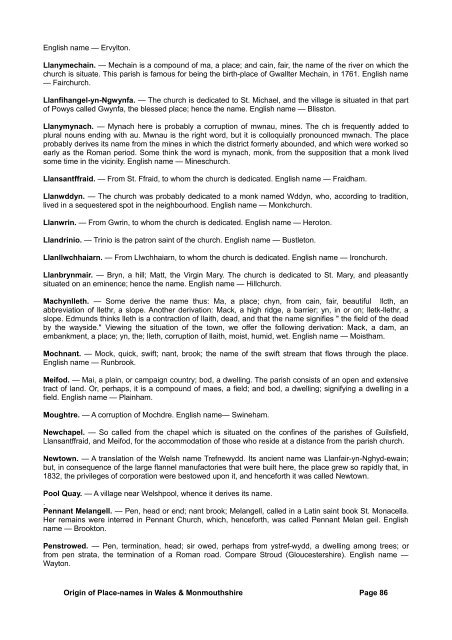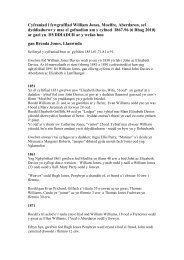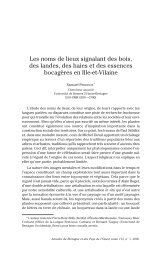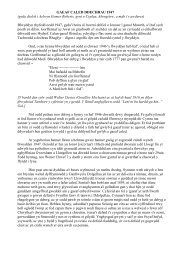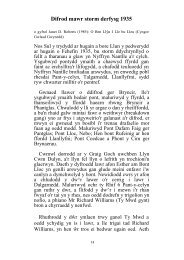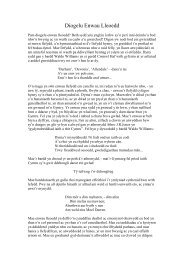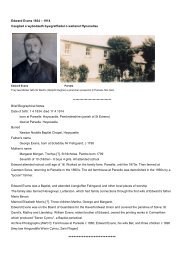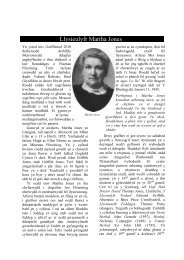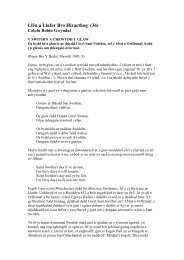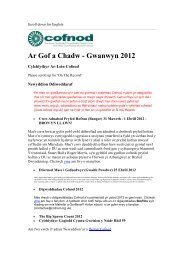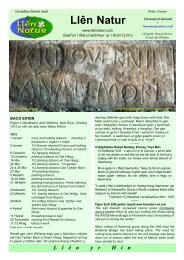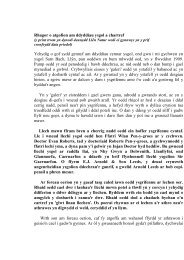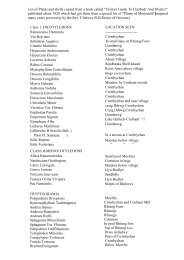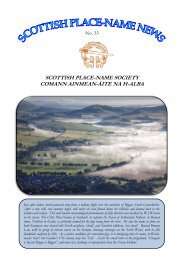Glyn Trefnant. — Glyn, a glen, a narrow vale; Trefnant is a corruption <strong>of</strong> tri-nant, three brooks, so calledfrom <strong>the</strong> confluence <strong>of</strong> three brooks <strong>in</strong> <strong>the</strong> <strong>place</strong>. English name — Glenbrooks.Gribb<strong>in</strong>. — A compound <strong>of</strong> crib, crest, summit; y, <strong>the</strong> ; bryn, hill; signify<strong>in</strong>g a <strong>place</strong> situated high on <strong>the</strong> hill.Crib mynydd, <strong>the</strong> summit <strong>of</strong> a mounta<strong>in</strong>. English name — Cresthill.Guilsfield. — The Welsh name is Cegidfa, signify<strong>in</strong>g a <strong>place</strong> <strong>of</strong> hemlock, or, perhaps, it is a compoundoicegid, <strong>the</strong> bird witwal; <strong>and</strong> fan-man, <strong>place</strong>. Some derive Guilsfield from St. Gulan's field. Perhaps it is acompound <strong>of</strong> guild, an <strong>in</strong>corporation, <strong>and</strong> field.Gungrog. — A corruption <strong>of</strong> Gwaun-y-grog, <strong>the</strong> meadow <strong>of</strong> <strong>the</strong> cross, so called from <strong>the</strong> supposition that across was erected here <strong>in</strong> <strong>the</strong> middle ages <strong>in</strong> connection with <strong>the</strong> Ystrad Farchell monastery. English name— Crossmeadow.Gwestydd. — From gwest-ty-dd<strong>in</strong>, <strong>the</strong> camp rest<strong>in</strong>g-<strong>place</strong>. English name — Campham.Gwern-y-Bwlch. — Gwern, a swamp, a bog; y, <strong>the</strong>; bwlch, a pass, a gap. The name is derived from amounta<strong>in</strong>-pass <strong>in</strong> <strong>the</strong> district, from which a distant view <strong>of</strong> Cader Idris is obta<strong>in</strong>ed. English name —Passmeadow.Gwern Esgob. — Gwern, a swamp, a meadow; Esgob, a bishop. English name — Bishop's Meadow.Hirnant. - Hir, long; nant, a brook. The village is situated <strong>in</strong> a narrow valley, <strong>and</strong> watered by an<strong>in</strong>considerable stream, tributary to <strong>the</strong> Tanat. English name — Longstream.Llangadfan. — The church was dedicated to St. Cadfan. The " Myvyrian " says: — " This Cadvan, be<strong>in</strong>g anobleman <strong>and</strong> son-<strong>in</strong>-law <strong>of</strong> <strong>the</strong> k<strong>in</strong>g <strong>of</strong> Armorica, came over with Uthr Bendragon, or his son k<strong>in</strong>g Arthur, <strong>and</strong>a great number <strong>of</strong> pious <strong>and</strong> learned men <strong>in</strong> his ret<strong>in</strong>ue, <strong>and</strong> chose for his residence Ynys Enlli (that is <strong>the</strong>monastery <strong>in</strong> <strong>the</strong> Isle <strong>of</strong> Bardsey), where he was an abbot, <strong>and</strong> many <strong>of</strong> his followers had churchesdedicated to <strong>the</strong>m' Some <strong>of</strong> his followers were Cynon, Padarn, Tydecho, Dochtwy, Mael, &c. Cadvan means<strong>the</strong> battle-<strong>place</strong>. English name — Warriorston.Llangurig. — A village near Pl<strong>in</strong>limmon. The church was dedicated to Curig, an em<strong>in</strong>ent sa<strong>in</strong>t <strong>of</strong> <strong>the</strong> seventhcentury. Eisllddfa Curig, Moel Gurig, <strong>in</strong> <strong>the</strong> same vic<strong>in</strong>ity, bear his name. Curig-curiog means bear<strong>in</strong>g pa<strong>in</strong> oraffliction. English name — Pa<strong>in</strong>ton.Llanfyll<strong>in</strong>. — From Myll<strong>in</strong>, to whom <strong>the</strong> church was dedicated. Myll<strong>in</strong> is an old Welsh word imply<strong>in</strong>g a violet.English name — Violaton.Llanwyddelen. — From Gwyddelan, <strong>the</strong> patron sa<strong>in</strong>t <strong>of</strong> <strong>the</strong> church. Gwyddelan is probably a compound <strong>of</strong>gwydd, wood, <strong>and</strong> ela<strong>in</strong>, a young h<strong>in</strong>d, a fawn. English name — Fawnwood.Llanidloes. — Id-loes, a sa<strong>in</strong>t <strong>of</strong> <strong>the</strong> seventh century, is <strong>the</strong> patron sa<strong>in</strong>t <strong>of</strong> <strong>the</strong> church. Pr<strong>of</strong>essor Rhys refers<strong>the</strong> prefix id to <strong>the</strong> Skr. yudh, " to fight ;" <strong>and</strong> Ioes is probably a mutation <strong>of</strong> glwys, full <strong>of</strong> love, signify<strong>in</strong>g oneeager to fight; or perhaps <strong>the</strong> suffix is gloes, a pang, a pa<strong>in</strong>. We adopt <strong>the</strong> former. English name — Mileston.Ll<strong>and</strong><strong>in</strong>am. — D<strong>in</strong>am is referred by some to <strong>the</strong> Roman D<strong>in</strong>utn, a frequent term<strong>in</strong>ation <strong>in</strong> <strong>place</strong>-<strong>names</strong> <strong>in</strong>Gaul <strong>and</strong> Brita<strong>in</strong>, equivalent to <strong>the</strong> English Tune, now ton, town, &c. English name — Churchton.Llangynog. — The church is dedicated to Cynog <strong>the</strong> eldest son <strong>of</strong> Brychan. English name — Kynogton.Llanwynog. — Gwynog, son <strong>of</strong> Gildas, a sa<strong>in</strong>t <strong>of</strong> <strong>the</strong> sixth century, is <strong>the</strong> patron sa<strong>in</strong>t <strong>of</strong> <strong>the</strong> church. Englishname — Whitham.Ll<strong>and</strong>ysilio. — The church is dedicated to Tysilio, <strong>the</strong> son <strong>of</strong> Brochwel Ysgythrog. English name — Tysilton.Llanfair Caere<strong>in</strong>ion. — Llanfair, a church dedicated to St. Mary. Caer, fortress; E<strong>in</strong>ion, <strong>the</strong> name <strong>of</strong> <strong>the</strong> rivernear which <strong>the</strong> town is situated. The latter part <strong>of</strong> <strong>the</strong> name is derived from an old British encampment, aboutthree miles from <strong>the</strong> town, parts <strong>of</strong> which are discernible to this day. English name — Eynon's Fort.Llanerfyl. — The church is dedicated to Erfyl, <strong>in</strong> memory <strong>of</strong> whom a large stone is erected <strong>in</strong> <strong>the</strong> churchyard.Orig<strong>in</strong> <strong>of</strong> Place-<strong>names</strong> <strong>in</strong> Wales & Monmouthshire Page 85
English name — Ervylton.Llanymecha<strong>in</strong>. — Mecha<strong>in</strong> is a compound <strong>of</strong> ma, a <strong>place</strong>; <strong>and</strong> ca<strong>in</strong>, fair, <strong>the</strong> name <strong>of</strong> <strong>the</strong> river on which <strong>the</strong>church is situate. This parish is famous for be<strong>in</strong>g <strong>the</strong> birth-<strong>place</strong> <strong>of</strong> Gwallter Mecha<strong>in</strong>, <strong>in</strong> 1761. English name— Fairchurch.Llanfihangel-yn-Ngwynfa. — The church is dedicated to St. Michael, <strong>and</strong> <strong>the</strong> village is situated <strong>in</strong> that part<strong>of</strong> Powys called Gwynfa, <strong>the</strong> blessed <strong>place</strong>; hence <strong>the</strong> name. English name — Blisston.Llanymynach. — Mynach here is probably a corruption <strong>of</strong> mwnau, m<strong>in</strong>es. The ch is frequently added toplural nouns end<strong>in</strong>g with au. Mwnau is <strong>the</strong> right word, but it is colloquially pronounced mwnach. The <strong>place</strong>probably derives its name from <strong>the</strong> m<strong>in</strong>es <strong>in</strong> which <strong>the</strong> district formerly abounded, <strong>and</strong> which were worked soearly as <strong>the</strong> Roman period. Some th<strong>in</strong>k <strong>the</strong> word is mynach, monk, from <strong>the</strong> supposition that a monk livedsome time <strong>in</strong> <strong>the</strong> vic<strong>in</strong>ity. English name — M<strong>in</strong>eschurch.Llansantffraid. — From St. Ffraid, to whom <strong>the</strong> church is dedicated. English name — Fraidham.Llanwddyn. — The church was probably dedicated to a monk named Wddyn, who, accord<strong>in</strong>g to tradition,lived <strong>in</strong> a sequestered spot <strong>in</strong> <strong>the</strong> neighbourhood. English name — Monkchurch.Llanwr<strong>in</strong>. — From Gwr<strong>in</strong>, to whom <strong>the</strong> church is dedicated. English name — Heroton.Ll<strong>and</strong>r<strong>in</strong>io. — Tr<strong>in</strong>io is <strong>the</strong> patron sa<strong>in</strong>t <strong>of</strong> <strong>the</strong> church. English name — Bustleton.Llanllwchhaiarn. — From Llwchhaiarn, to whom <strong>the</strong> church is dedicated. English name — Ironchurch.Llanbrynmair. — Bryn, a hill; Matt, <strong>the</strong> Virg<strong>in</strong> Mary. The church is dedicated to St. Mary, <strong>and</strong> pleasantlysituated on an em<strong>in</strong>ence; hence <strong>the</strong> name. English name — Hillchurch.Machynlleth. — Some derive <strong>the</strong> name thus: Ma, a <strong>place</strong>; chyn, from ca<strong>in</strong>, fair, beautiful llcth, anabbreviation <strong>of</strong> llethr, a slope. Ano<strong>the</strong>r derivation: Mack, a high ridge, a barrier; yn, <strong>in</strong> or on; lletk-llethr, aslope. Edmunds th<strong>in</strong>ks lleth is a contraction <strong>of</strong> llaith, dead, <strong>and</strong> that <strong>the</strong> name signifies " <strong>the</strong> field <strong>of</strong> <strong>the</strong> deadby <strong>the</strong> wayside." View<strong>in</strong>g <strong>the</strong> situation <strong>of</strong> <strong>the</strong> town, we <strong>of</strong>fer <strong>the</strong> follow<strong>in</strong>g derivation: Mack, a dam, anembankment, a <strong>place</strong>; yn, <strong>the</strong>; lleth, corruption <strong>of</strong> llaith, moist, humid, wet. English name — Moistham.Mochnant. — Mock, quick, swift; nant, brook; <strong>the</strong> name <strong>of</strong> <strong>the</strong> swift stream that flows through <strong>the</strong> <strong>place</strong>.English name — Runbrook.Meifod. — Mai, a pla<strong>in</strong>, or campaign country; bod, a dwell<strong>in</strong>g. The parish consists <strong>of</strong> an open <strong>and</strong> extensivetract <strong>of</strong> l<strong>and</strong>. Or, perhaps, it is a compound <strong>of</strong> maes, a field; <strong>and</strong> bod, a dwell<strong>in</strong>g; signify<strong>in</strong>g a dwell<strong>in</strong>g <strong>in</strong> afield. English name — Pla<strong>in</strong>ham.Moughtre. — A corruption <strong>of</strong> Mochdre. English name— Sw<strong>in</strong>eham.Newchapel. — So called from <strong>the</strong> chapel which is situated on <strong>the</strong> conf<strong>in</strong>es <strong>of</strong> <strong>the</strong> parishes <strong>of</strong> Guilsfield,Llansantffraid, <strong>and</strong> Meifod, for <strong>the</strong> accommodation <strong>of</strong> those who reside at a distance from <strong>the</strong> parish church.Newtown. — A translation <strong>of</strong> <strong>the</strong> Welsh name Trefnewydd. Its ancient name was Llanfair-yn-Nghyd-ewa<strong>in</strong>;but, <strong>in</strong> consequence <strong>of</strong> <strong>the</strong> large flannel manufactories that were built here, <strong>the</strong> <strong>place</strong> grew so rapidly that, <strong>in</strong>1832, <strong>the</strong> privileges <strong>of</strong> corporation were bestowed upon it, <strong>and</strong> henceforth it was called Newtown.Pool Quay. — A village near Welshpool, whence it derives its name..Pennant Melangell. — Pen, head or end; nant brook; Melangell, called <strong>in</strong> a Lat<strong>in</strong> sa<strong>in</strong>t book St. Monacella.Her rema<strong>in</strong>s were <strong>in</strong>terred <strong>in</strong> Pennant Church, which, henceforth, was called Pennant Melan geil. Englishname — Brookton.Penstrowed. — Pen, term<strong>in</strong>ation, head; sir owed, perhaps from ystref-wydd, a dwell<strong>in</strong>g among trees; orfrom pen strata, <strong>the</strong> term<strong>in</strong>ation <strong>of</strong> a Roman road. Compare Stroud (Gloucestershire). English name —Wayton.Orig<strong>in</strong> <strong>of</strong> Place-<strong>names</strong> <strong>in</strong> Wales & Monmouthshire Page 86
- Page 1 and 2:
HANDBOOK OF THE ORIGIN OF PLACE-NAM
- Page 3 and 4:
§ § § § §The Author begs to st
- Page 5 and 6:
pitiful cries of the railway offici
- Page 7 and 8:
Bishop Percy says that "in England,
- Page 9 and 10:
The city of Chester is still popula
- Page 11 and 12:
There's Cumwhitton, Cumwhinton, Cum
- Page 13 and 14:
Llwyn in its primary' sense means a
- Page 15 and 16:
PLACE-NAMES IN WALES.Wales. — The
- Page 17 and 18:
Church are generally dedicated to e
- Page 19 and 20:
think he was a contemporary of St.
- Page 21 and 22:
Rhosbeirio. — Rhos, a moor, a dry
- Page 23 and 24:
of Brecknock," states that this vic
- Page 25 and 26:
Cam cnwir ef Cwmdu,Cwm gwyn yw & n
- Page 27 and 28:
Penderyn. — A corruption probably
- Page 29 and 30:
Ardudwy. — Ar, upon or above; tud
- Page 31 and 32:
to mark its pre-eminence over the o
- Page 33 and 34:
Some think that eirw is a corruptio
- Page 35 and 36:
present form — Caerfyrddin.Abergw
- Page 37 and 38: place of refuge; hence the name. En
- Page 39 and 40: Llansawyl. — The church was dedic
- Page 41 and 42: eject. The village took its name fr
- Page 43 and 44: house, and attempted to kill an inf
- Page 45 and 46: Gwydir. — Prima facie one may tak
- Page 47 and 48: Nefyn. — The church was probably
- Page 49 and 50: DENBIGHSHIRE.Anglicized form of Din
- Page 51 and 52: Llangollen. — From Collen, a sain
- Page 53 and 54: hands into their pockets to pay a c
- Page 55 and 56: Cefn. — The name signifies a ridg
- Page 57 and 58: Maesgarmon. — Named in honour of
- Page 59 and 60: Abertridwr. — Tridwr, three water
- Page 61 and 62: it is said, was originally built by
- Page 63 and 64: Cwmllynfell. — Cwm, a narrow vale
- Page 65 and 66: Gwarycaeau. — Gwdr, the nape of t
- Page 67 and 68: means a cultivated region, a vale,
- Page 69 and 70: Penrhiwfer.- Pen, head, top; rhiw,
- Page 71 and 72: Port Talbot. — So called in 1835
- Page 73 and 74: Trealaw. — This appellation was g
- Page 75 and 76: Aberdyfi. — So called from its si
- Page 77 and 78: Llanddwywe. — From Dwywau, a desc
- Page 79 and 80: Crickhowell and some in the directi
- Page 81 and 82: Griffithstown. — This village was
- Page 83 and 84: and gwy, water. Treiddiod troth tna
- Page 85 and 86: derive Tintern from din, fortified
- Page 87: Caersws. — It appears that the Ro
- Page 91 and 92: Angle. — Probably from the angle-
- Page 93 and 94: Gellyswick. — Another hybrid. Gel
- Page 95 and 96: that the two rivers in their flowin
- Page 97 and 98: ecame the bishop of the see, and wa
- Page 99 and 100: earth formerly stood on a summit on
- Page 101 and 102: Pilleth. — A corruption of pwll,
- Page 103 and 104: Howells, Rev. J., Mountain AshHowel
- Page 105 and 106: Williams, D., PenywernWilliams, Rev


